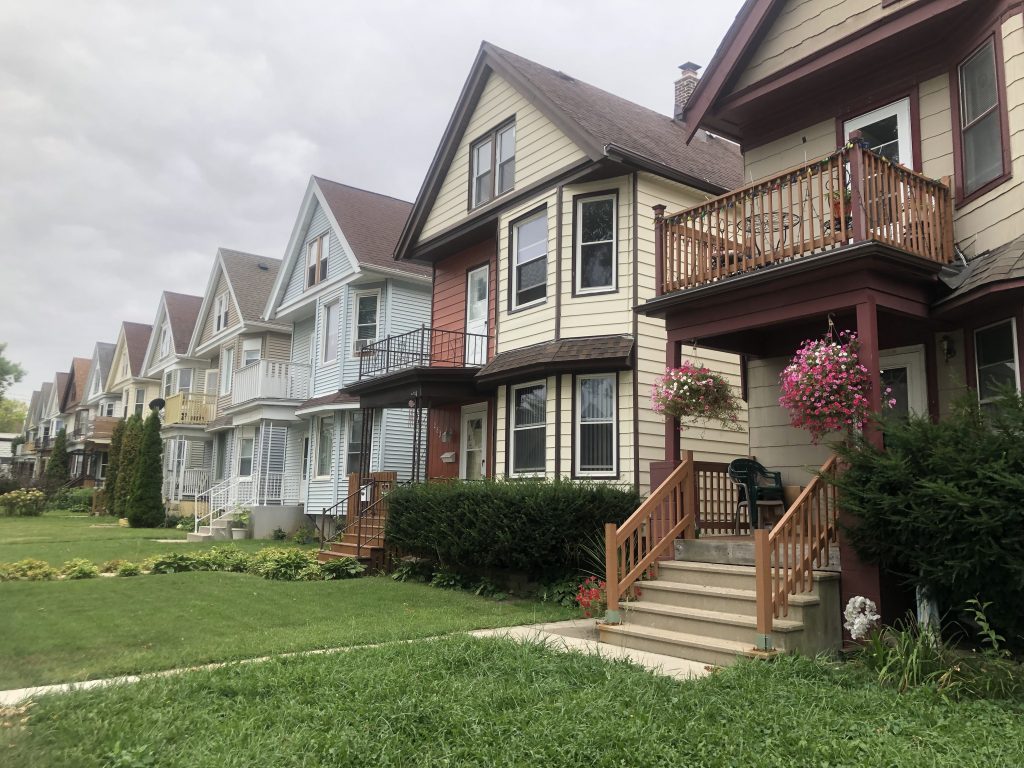Two of Milwaukee’s Largest Corporate Landlords Selling Their Houses, With Wildly Different Results
One is making huge profits while the other is losing money.
Three large, private equity-backed corporate landlords operate in Milwaukee’s house rental market. All three began buying lots of Milwaukee houses in 2018 or 2019, and they ended 2022 owning just shy of 1,500 homes in total. The largest, VineBrook Homes, bought over 450 houses in Milwaukee last year, according to city property records.
But all three companies mostly ceased buying houses by late 2022, and in fact, two of the three have spent early 2023 selling houses. One of the companies, SFR3, has made double the money it spent to buy those properties. The other company, VineBrook, has actually lost money on these transactions. The third company, Highgrove Holdings, ended its buying spree months before the other two, but hasn’t sold anything recently.
The different trajectories of these three companies give clues to their financial health, business strategy and potential consequences they may have on Milwaukee neighborhoods.
In some ways, SFR3 and VineBrook follow similar business models. Both are private companies that raise money by selling securities to qualified investors. Over the past few years, each has bought thousands of cheap houses across cities in the Midwest and South.
In Milwaukee, each focuses on single-family homes usually worth around $100,000. They mainly buy homes on the north side of the city – either north of W. Capitol Drive or west of N. 35th Street. VineBrook is much larger. At the end of 2022, it owned about 950 houses in Milwaukee and 27,000 across the country. SFR3 owned about 240 in Milwaukee, while their website claims “thousands of single-family rentals” in total. Neither are primarily flippers; instead, they follow a buy-to-rent business model.
Before 2023, I couldn’t find any record of VineBrook selling a house in Milwaukee. SFR3 was more willing to flip their recent acquisitions, selling 14 in 2021 and 45 in 2022. Through mid-May 2023, SFR3 has recorded 25 more house sales and VineBrook 13.
I was able to directly compare the sale price with the purchase price in 23 of SFR3’s sales this year. They paid $2,084,630 for those 23 properties, owned them for an average of 67 weeks and sold them for $4,218,000 – a profit of 102%.
Twenty of the houses were sold to an owner-occupier, according to transaction returns filed with the Wisconsin Department of Revenue.
Direct comparisons were possible for 11 of VineBrook’s 2023 sales, all of which took place between March 16 and May 12. VineBrook paid $966,112 for these 11 properties, owned them for an average of 103 weeks and sold them for $909,500 – a loss of 6%. They only sold one of these properties to an owner-occupier.
SFR3 made a profit in each comparable home sale, not counting any rehabilitation expenses. The company’s biggest gain came on a house it bought on the 1500 block of N. 57th Street in the Washington Heights neighborhood. They paid $153,000 in November 2021 and sold it for $331,000 in February 2023.
VineBrook, meanwhile, lost money on six sales. The biggest gain was just $15,000. It paid $85,000 in June 2021 for a house on the 2900 block of N. 46th Street and sold it for $100,000 in May 2023.
The company’s worst loss came just a few blocks away, on the 2300 block of N. 47th Street. That house was purchased out of foreclosure by an owner-occupier for $33,000 in December 2019. Then, that buyer sold to VineBrook for $109,000 in December 2020. VineBrook sold it to another owner-occupier for $50,000 in April 2023. This appears to be the rare instance where two owner-occupiers made out well at the expense of a private equity firm.
Why is SFR3 so much better at selling for a profit than VineBrook? It appears that SFR3 is both a savvier buyer and a more patient seller than its larger rival.
Take those 23 SFR3 sale comparisons from this year. When SFR3 bought them, it paid just 89% of the then-assessed value of the properties. When it sold, it received 162% of the current assessed value (Assessed values are based on comparable property sales in recent years).
By comparison, VineBrook originally paid 115% of the assessed value of the houses it went on to sell in 2023. When it sold them, it received just 83% of the current assessed value.
SFR3 made shrewder purchases to begin with, but it also made more money by selling to owner-occupiers who were willing to pay top dollar. VineBrook apparently overpaid for houses to begin with, and it also appears to be selling hastily, usually to other landlords.
VineBrook’s troubles extend far beyond Milwaukee.
In January, the company forfeited $41 million in initial deposits after terminating purchase agreements to buy about 2,900 more houses (not in Wisconsin). This contributed to its $92.4 million net loss in the first quarter of 2023. By comparison, VineBrook also reported a net loss of $2.7 million in the first quarter of 2022. The company also faces challenges from rising interest rates. As of March 31, the company’s total debt was $2.6 billion, of which $1.9 billion was in floating interest rate loans.
In an April 2023 letter to shareholders, VineBrook’s CFO described the company’s intention to “opportunistically pursue dispositions that offer the ability to recycle capital into accretive opportunities and reduce our exposure to sub-scale markets. In addition to using net proceeds from sales to further fund our revitalization program, we intend to use the remaining net proceeds to de-lever the Company, improving our balance sheet and the strength of the Company.”
In plain English, the company intends to spend 2023 selling houses in order to pay off debt.
Highgrove Holdings and SFR3 aren’t required to make the same kinds of detailed financial disclosures, so we have less insight into the health of their balance sheets. Still, the fact that SFR3 only sells its homes for substantial profits, while Highgrove has sold nothing at all, suggests that they don’t currently face the same financial crunch as VineBrook.
As Milwaukee’s home rental market grows more consolidated, we may see more situations where large landlords facing financial difficulties seek to offload many properties at once. VineBrook’s current willingness to sell its houses at relatively cheap prices has mainly just benefited other landlords. The house on 47th Street described above is the exceptional case in which VineBrook’s struggles actually benefited a local homeowner.
You can read additional information on the habits of the three corporate landlords and other property owners in an April column by Johnson.
John Johnson is a Research Fellow at the Lubar Center for Public Policy Research and Civic Education at the Marquette Law School. His work focuses on housing, demographic, and political trends in Wisconsin and the Milwaukee metro area.
If you think stories like this are important, become a member of Urban Milwaukee and help support real, independent journalism. Plus you get some cool added benefits.






















